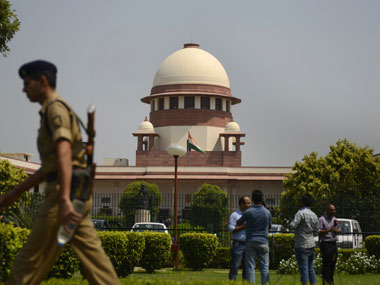By Rakesh Bhatnagar There’s no reason for the Union Government to express surprise at the 1000-page judgment passed by a five-judge bench of the Supreme Court scrapping the constitutional amendment that had paved the way for divesting judiciary of its power to appoint judges to High Courts and the Supreme Court. Congress Rajya Sabha MP Abhishek Manu Singhvi had suggested fine tuning of the law setting up the National Judicial Appointments Commission (NJAC) lest it should fail the test of judicial review. [caption id=“attachment_2471430” align=“alignleft” width=“380”] Representational image. AFP[/caption] While participating in the discussion on the 99th constitutional amendment for evolving a new mechanism of filling up vacancies of judges and their transfer, Singhvi had supported the NDA government’s revived law to curtail the supremacy of the judiciary in appointments of judges. But he had also warned, in unequivocal terms, against retaining certain provisions that could fall foul of the judicial independence. “This Bill styles itself as a procedure for appointment and we treat the Constitutional 99th Amendment, which is passed just a short while ago, as the basic substantive one. That is a cardinal error because this Bill has several substantive provisions which are alien to the existing model envisaged in Articles 124(2) and 217 of the Constitution. These Articles envisage appointment of judges to Supreme Court and high courts respectively,” he had said. He was sceptical about “many” of its provisions which were alien to the existing model envisaged in Articles 124(2) and 217 of the Constitution that provide for appointment of judges and cautioned the government not to be cocky because the Bill was being passed with full legislative backing of all political parties. “I am not saying it out of negativity, but I am making a constructive sort of suggestion which may impinge on the Constitutional validity of this Bill in the near future. That does not arise out of fear. It arises out of good sense. This House is not afraid of passing a Bill which might be invalidated by the Judiciary, but this House can’t insulate that Bill for invalidation by a 100 per cent vote,” Singhvi had noted. He further said that the House “can insulate the Bill from invalidation, if you make a good Bill and you remove every possible weakness of invalidation. On the Bill, you have Section 5 (1). It brings in a very substantive change. It, in a sense, provides for and legitimises supersession (of the senior-most SC judge) by the National Judicial Commission for the first time.” He also wondered why “Law Minister Ravi Shankar Prasad and his Government have added a small five-word caveat." Singhvi pointed out that any caveat that suggested that the executive could dispense with the convention of the senior-most judge replacing an outgoing Chief Justice would stumble at the stage of judicial review. The five-word caveat Singhvi was referring to is “but if he is fit”. “You know there was a huge outcry when Mrs Indira Gandhi did a supersession way back in the ’70s. The supersession is directly subversive of judicial independence and judicial independence is a core part of the basic structure. Now (in the new National Judicial Commission), there are four or five words which say, ‘You shall appoint the senior most but if he is fit’. That ‘but if he is fit’ has not been with the executive’s mixed bag. It may have been partly a consideration of the Judiciary,” Singhvi, a senior constitutional lawyer, had said pointing out a major lacuna in the law. “Formally, every outgoing Chief Justice of India recommends his successor. But, that is a formal recommendation. If this power - and I am saying it only for a future abuse - is used by the NJC to suggest that the (outgoing) Chief Justice of India is not succeeded by the senior-most judge of India, then, there is in effect supersession," he had told the Rajya Sabha. “Would you be able to justify the supersession by using the words ‘if he is considered fit’? I doubt very much,” he had added. While responding to the debate, Law Minister Prasad had said Singhvi’s first objection was the likely supersession about the senior-most Judge as the CJI because it says, ‘but if found fit’. He argued that “but if found fit” was there in the annals of appointment of CJIs since 1998. “I would like to inform him and the House that it is not my invention. It is there in the Memorandum of Procedure prepared in consultation with the Supreme Court since 1998 that the senior-most Judge, if found fit, shall be appointed as the Chief Justice. And this whole apprehension that the two juniors will conspire to deny him…(is not material because), there will be the Law Minister and two the eminent persons (on the NJAC) who are there to consider this,” he had added. Prasad also dealt with Singhvi’s concen that Supreme Court “may strike it down”. “If the Supreme Court will strike down a regulation by a Commission headed by the Chief Justice, of which the two senior-most Judges are the Members, what can I do? Therefore, I am surprised. Again, I say we have taken the maximum care to make it as flawless as possible and I think that is very clear. We should not be a little bit troubled about that.”
Singhvi had supported the NDA government’s revived law to curtail the supremacy of the judiciary in appointments of judges.
Advertisement
End of Article
Written by FP Archives
see more


)

)
)
)
)
)
)
)
)



